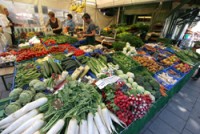Fresh vs Frozen Produce – Is One Really Better Than the Other?

When it comes to food produce, the debate of fresh versus frozen and which one is better is a common topic of discussion.
But is fresh really better than frozen, or have we simply been led to believe this is the case? After all, we know that freezing food goods essentially halts their ageing process, so does this mean it also maintains all the nutritional value akin to a fresh product? In this blog, we explore and answer these questions.
Fresh vs frozen
While many people would claim that fresh is always best, the simple fact is it’s not possible to always deliver fresh produce for people to purchase and consume on the day. That’s why frozen goods are such a popular option. One of the most popular forms of frozen goods are frozen vegetables, which allow to purchase them for now and use them later down the track.
To give you an idea of how frozen vegetables are put together, here’s a general overview:
- Vegetables are picked when they’re in season (the best possible time to pick)
- The vegetables are then immediately blanched, which is done to effectively clean the vegetables and remove any possible toxins/bacteria
- Vegetables are then packed almost immediately and frozen
Due to this process, the vegetables are frozen as close to their freshest state as possible. As mentioned, freezing most food goods basically halts the ageing or depreciation of the goods.
So, now that we’ve covered that, is fresh better than frozen? Well, fresh is still a great way to enjoy your vegetables, but frozen really isn’t that much different. In tests done into measuring the difference in nutritional value between fresh and frozen, almost all have these tests have found that fresh and frozen is basically identical.
To be more specific, calcium and potassium levels in fresh vegetables tend to be marginally higher, but vitamin C in frozen vegetables can be notably higher, usually around 2x higher. The reason for the increase in vitamin C is because cooler conditions nurture a growth in vitamin C levels.
When looking at it from an overall level, fresh vegetables do have more nutrients, but fresh vegetables also lose nutrients far quicker than what frozen vegetables do. By simply being exposed to air and light, nutrient levels drop in fresh fruit at a fairly rapid rate. So if you’re going to buy fresh fruit, you’ll want to consume it ASAP. Or, you can always freeze it and prevent the nutrient levels from dropping as quickly.
Moving away from vegetables, meat presents a very similar set of circumstances. When comparing a fresh cut of meat against a frozen cut of meat (even one that has been frozen for a couple of years), the nutrient levels will basically be the same. However, caution does need to be taken with meat as, over time, the fat on meat can break down, even when frozen. The more the fat in meat breaks down, the more toxic it can become.
A general guide to freezing
So if there isn’t much difference between fresh and frozen from a nutritional standpoint, what’s the longest period of time you should ever freeze any type of food for? While you can freeze food countless years and the nutrients could potentially stay the same, that doesn’t mean they’re good to eat. Ideally, you should only freeze and consume and the following goods within the these timeframes:
- Beef and lamb – 12 months
- Chicken and pork – 6 months
- Vegetables – 6 months
- Seafood – 3 months
Also worth noting is that you should aim for a freezing temperature of about -18 degrees (that’s celsius). Often most people won’t do this as they want to keep their ice cream soft. But, if you can, consider devoting one freezer purely to freezing goods such as meats and vegetables and then devoting another freezer to cold goods such as ice cream.
What do you prefer? Fresh or frozen? Share with us in the comments below.